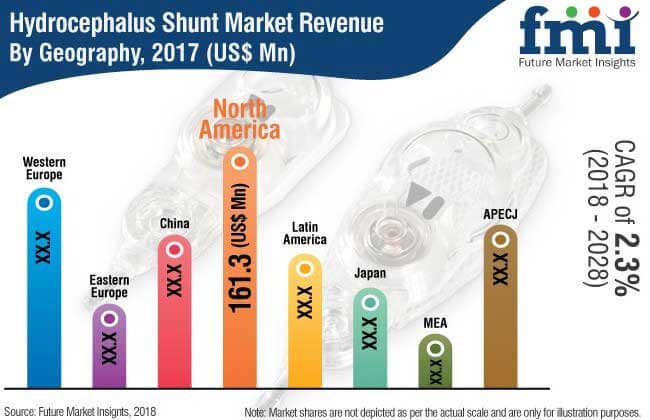Hydrocephalus Shunt Market in 2028 Projected to Exceed US$ 498.6 Mn Revenue, Globally
Future Market Insights foresees significant growth opportunities in hydrocephalus shunt market, considering the new-age development of smart shunt technology, while delivering advance diagnosis of cerebrospinal fluid (CSF), control, and communication, on the basis of sensors, telemetry, and feedback controls. Increasing focus on developing such smart shunt technology, is anticipated to prove favorable for the hydrocephalus shunt market—showcasing an otherwise sluggish landscape through the forecast period of 2018-2028, as per FMI’s analysis.

The research intelligence report offers a deep-dive view of the global hydrocephalus shunt market—predicted to expand at a rather sluggish rate of 2.3 percent, reaching a valuation of US$ 498.6 Mn in 2020.
Request Sample Report @ https://www.futuremarketinsights.com/reports/sample/rep-gb-7756
“Stringent regulatory policies is a key factor severely impacting the growth of hydrocephalus shunt market. In addition, mechanical risks including leaks, migration, obstruction, and discontinuity and biological complications including infection, abscess, pseudocyst, heamotoma, and peritonitis associated with shunt implants, is also a key factor contributing to the market’s slow-moving growth. Other contributing factors could include high surgery costs and shortage of trained neurologist—specifically reported in countries like Australia, Canada, Ireland, U.K, and New”, explains a senior analyst from the Healthcare domain. The analyst further explains that shunt blockage and malfunction are two common complication associated with stunt implants—blockages occurring in nearly 31 percent patients. Moreover, such risks and complications often result in a number of hydrocephalus shunt revision surgeries, further creating a notable demand for hydrocephalus shunt.
FMI offers key insights on the global hydrocephalus shunt market
-
Hydrocephalus valves segment is expected to hold a massive value share of nearly 85 percent.
-
Within the Hydrocephalus valves type, adjustable pressure valves is likely to witness maximum adoption in hydrocephalus shunt surgeries.
-
Highest growth potential exists in North America, with an attractiveness index of 2.6 during the forecast period. Such adoption trend is expected to be followed in Western Europe—the second most lucrative market, showcasing interesting profit possibilities.
-
By age group, pediatrics and infants segment will report maximum adoption of hydrocephalus shunt.
-
Ventriculoperitoneal will remain the most preferred procedure, pushing maximum revenue in the global hydrocephalus shunt.
Key Market Influencers: Technological Advancements and Awareness Campaigns for Hydrocephalus
Considering the complexity of hydrocephalus shunting along with adjustments of cerebrospinal fluid draining, manufacturers of hydrocephalus shunts are increasingly introducing programmable and anti-siphon shunt valves—aimed at regulating drainage pressure and flow. The new technologies are indicated to eliminate the need for surgery revisions as a result of complications. The cerebrospinal fluid management technologies are likely to witness increased adoption in the coming years considering its utility in reducing siphon effect over cerebrospinal fluid drainage. Programmable pressure valves are gaining prominence versus fix pressure valves owing to its external features using specialized magnetic devices that helps in modifying opening pressure of valves.
Additionally, demand for hydrocephalus shunts is slated to increase given the increasing number of government and private initiatives to spread awareness vis-à-vis hydrocephalus. Hydrocephalus Association, for instance, and its focus to conduct more hydrocephalus awareness campaigns and programs, with increased investments in research initiatives targeted at improving cure and treatment avenues for Hydrocephalus. Through its campaign ‘Roadmap to a Cure’, the organization, by 2020 is expected to invest US$20 and drive more research and support associated with hydrocephalus.
Request to View TOC @ https://www.futuremarketinsights.com/askus/rep-gb-7756
In the highly consolidated hydrocephalus shunt market, product and pricing power lies in the hand of top three players—reigning over nearly 84 percent of the total revenue share in the global hydrocephalus shunt market. Contributing nearly US$ 389 Million, the top three players include Medtronic Plc., Integra LifeSciences Corporation, and B. Braun Melsungen AG. Key forward market strategies include- viz. Efforts to gain regulatory approvals, geographic expansions in emerging economies, production capacity expansion, increased investments in R&D, and acquisitions to solidify global position in neurosurgery and regenerative technologies.
